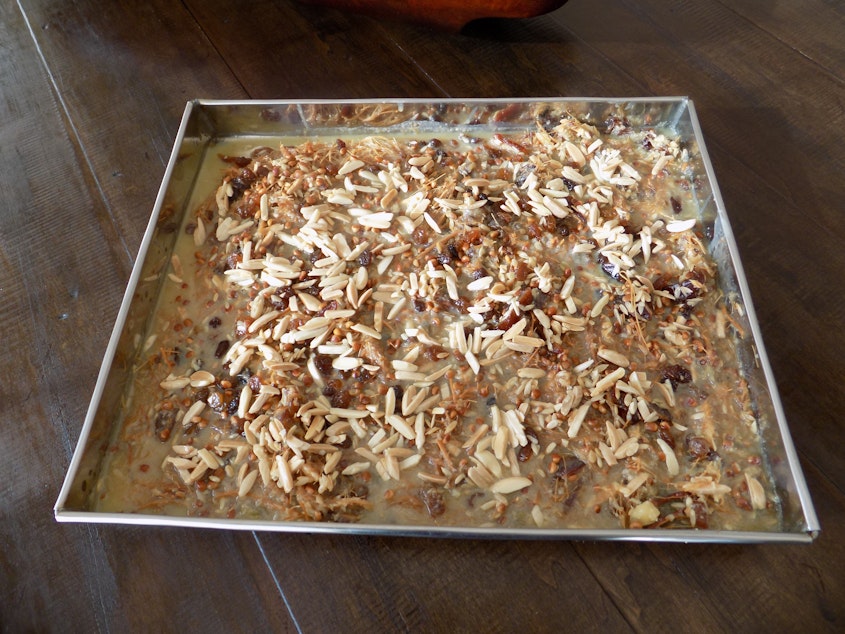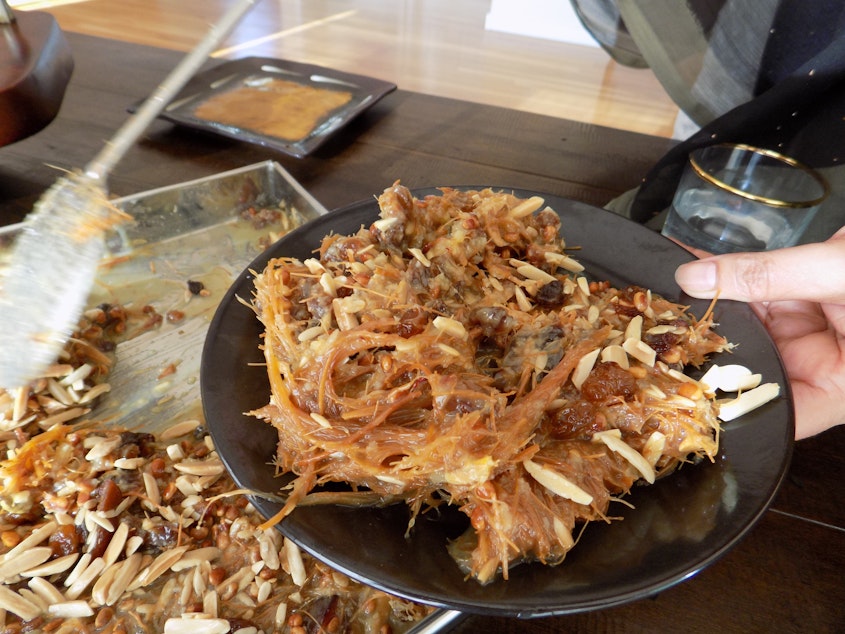In Seattle and Sammamish, tables are being set to celebrate the end of Ramadan

Tuesday night many Muslims will celebrate Eid, a festival to mark the end of Ramadan, the Muslim holy month of fasting.
Often there’s a feast, and the foods are as diverse as the community.
For Nickhath Sheriff of Sammamish, Eid would not be complete without the sweet from her childhood. It’s made with a kind of vermicelli noodles that she has to special order from her hometown of Chennai, India.
“This is the sewaiyya I was telling you about,” she said, showing me a box of noodles that are delicate and as thin as thread. “We just got it from India. And this is handmade.”
Sheriff has two pans on the burner. One is filled with sugar and water. She tosses in some cloves, cardamom and cinnamon sticks. In the other pan, Sheriff heats up some clarified butter where she’ll brown the noodles.
Sheriff said she learned to make this sweet dish from her mother and grandmother. “I watched them cook this dish and just taught myself a few things," she said.
When she came to an ingredient she couldn't find, "I just altered them with what was available in this country.”
Sheriff said Eid is a big holiday for Muslims; it’s like Christmas or Thanksgiving in other cultures, a gathering of families and friends.
But before that, there’s work to do to get ready.
“People go to the marketplace, some people will start putting henna on the hand, some people will start cutting, cleaning and cooking, and start preparing for next day.”

Sheriff said she has fond memories of Eid growing up. So when she and her husband moved to Seattle in 1991, they started hosting celebrations in their home every year to keep the traditions alive — "keep my connection going."
Over the years, Sheriff’s celebration has grown to more than 300 guests. For her, Eid is not just about sharing food; it’s also about counting blessings.
For converts to Islam, though, the initial challenge is how to make the celebration their own.
“Do I make turkey for Ramadan?” Michaela Corning of Northgate wondered when she converted 20 years ago.
“There’s not a right way. If I talk to 20 of my convert friends, whether they’re Latina, or black or white, they’re going to have their own traditions, which is kind of fun,” Corning said.
Like her convert friends, Corning developed her own traditions, which includes sambosa, a savory, filled pastry similar to Indian samosas, but flat. She also makes Libyan soup, a tomato broth-based soup with lamb, orzo, parsley, mint and a special Libyan spice mixture that’s hard to find here.
“I have friends that bring me like a Tupperware container of it every year for Ramadan!” she said.
Back in Sammamish, Sheriff is putting the finishing touches on her dessert. Once the syrup has become lightly caramelized, she mixes in the nuts, melon seeds, dates and raisins. She blankets the noodles with the sweet mixture and spoons it over a tray.
Sheriff remembers the first time she made it and served it to a group of friends. One of them paused after taking a bite.
“It’s so rich,” the friend said. “It’s Bill Gates!" Everyone burst out laughing. And the name stuck. Every year now the same question comes up: Are you making Bill Gates this time?




